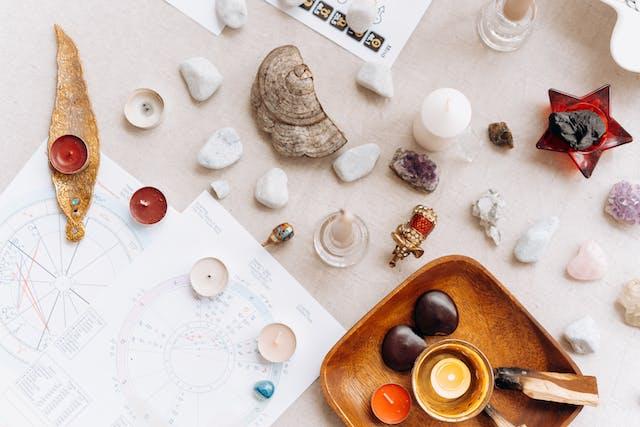
Acupuncture:
Acupuncture is an ancient Chinese healing practice that involves inserting thin needles into specific points along the body's energy pathways, known as meridians. The goal is to restore the flow of Qi (energy) and rebalance the body. Acupuncture is rooted in the belief that blockages or imbalances in the flow of Qi can lead to physical, mental, and emotional ailments. By stimulating specific acupuncture points, practitioners aim to restore harmony and promote healing. Benefits of Acupuncture:Pain Relief: Acupuncture has been widely recognized for its effectiveness in managing pain, including chronic pain conditions such as arthritis, migraines, and back pain. The stimulation of acupuncture points is believed to release endorphins, the body's natural painkillers, and promote better circulation. Stress Reduction: Acupuncture is known to have a calming effect on the nervous system, helping to reduce stress, anxiety, and insomnia. It can support emotional well-being and promote relaxation. Improved Digestion: Acupuncture can help regulate digestion by stimulating the organs involved in the digestive process. It has been found beneficial in treating conditions such as irritable bowel syndrome (IBS) and acid reflux. Enhanced Immune Function: Acupuncture treatments are believed to strengthen the immune system, improving the body's ability to fight off infections and illnesses.
Overall Well-being: Acupuncture is often used as a preventive measure to maintain overall health and well-being. Regular sessions can help balance energy, promote relaxation, and support the body's natural healing abilities.
Aromatherapy:
Aromatherapy is a holistic healing practice that utilizes essential oils derived from plants to promote physical, mental, and emotional well-being. Essential oils are highly concentrated plant extracts that capture the plant's aroma and properties. Aromatherapy can be experienced through inhalation or topical application, with each essential oil offering unique therapeutic benefits.Benefits of Aromatherapy:
Stress Relief: Aromatherapy is known for its ability to reduce stress and promote relaxation. Essential oils like lavender, chamomile, and ylang-ylang are commonly used for their calming properties.
Mood Enhancement: Different essential oils can have uplifting and mood-enhancing effects. Citrus oils, such as lemon and orange, are often used to promote feelings of positivity and energy.
Improved Sleep: Aromatherapy can help create a conducive environment for quality sleep. Essential oils like lavender and chamomile can relax the mind and promote a sense of tranquility, aiding in better sleep quality.
Physical Healing: Many essential oils possess antiseptic, anti-inflammatory, and analgesic properties. They can be used topically to support wound healing, reduce inflammation, and relieve pain.
Respiratory Support: Certain essential oils, such as eucalyptus and peppermint, have decongestant and expectorant properties, making them beneficial for respiratory conditions like colds, coughs, and sinus congestion.
Reiki:
Reiki is a Japanese healing technique that involves the transfer of energy through the hands of a trained practitioner. The word "Reiki" translates to "universal life energy" in Japanese. It is based on the belief that an unseen life force energy flows through us and is essential for our well-being. Reiki practitioners use their hands to channel this energy into the recipient's body, promoting balance and facilitating healing on physical, emotional, mental, and spiritual levels.Benefits of Reiki:
Stress Reduction: Reiki promotes deep relaxation, helping to alleviate stress, anxiety, and tension. The gentle touch and energy transfer during a Reiki session create a calming and nurturing environment.
Emotional Healing: Reiki can support emotional healing by releasing blocked energy and promoting emotional balance. It can help individuals process and release emotional trauma, facilitating a sense of peace and well-being.
Pain Management: Reiki has been found to be effective in reducing pain and discomfort. It can be used as a complementary therapy for individuals dealing with chronic pain conditions or recovering from injuries or surgeries.
Enhanced Self-awareness: Reiki sessions often promote self-reflection and introspection. Through the gentle energy transfer, individuals may gain insights, clarity, and a deeper connection with their inner selves.
Holistic Healing: Reiki addresses the whole person, promoting healing on physical, emotional, mental, and spiritual levels. It aims to restore balance and harmony, supporting the body's natural healing abilities and promoting overall well-being.
Exploring different holistic healing practices, such as acupuncture, aromatherapy, and Reiki, offers a glimpse into the vast world of alternative approaches to health and well-being. These practices recognize the interconnectedness of mind, body, and spirit and seek to restore balance and promote holistic healing. Acupuncture focuses on rebalancing the body's energy flow, aromatherapy utilizes the therapeutic properties of essential oils, and Reiki channels universal life energy to promote healing. Each practice offers unique benefits, ranging from pain relief and stress reduction to emotional healing and enhanced self-awareness.
By embracing these holistic approaches, individuals can complement traditional healthcare and take an active role in their own well-being. However, it is important to seek guidance from trained practitioners and understand that these practices may not replace conventional medical treatments. Holistic healing practices can serve as valuable tools in promoting overall wellness and supporting a balanced and harmonious life.
Article
Be the first comment
Elite Article














